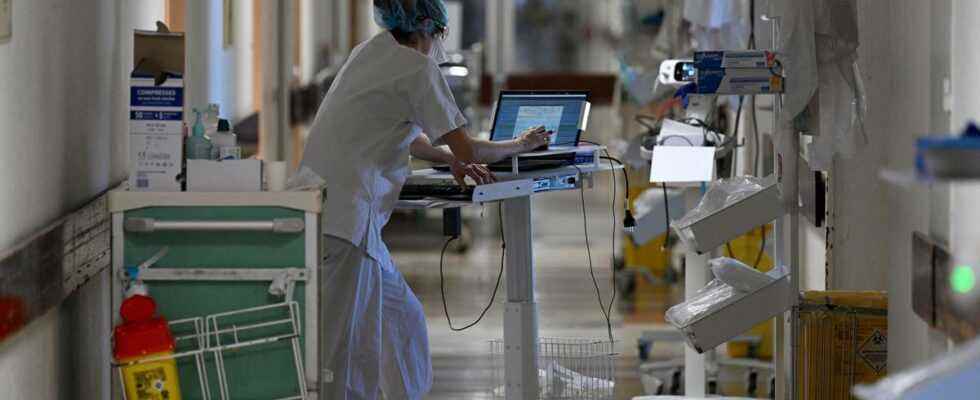Seized by the Minister of Health, the institution justifies its position in particular by the current epidemic context and the uncertainty around the months to come. The trade unions are convened next week.
His opinion was eagerly awaited, both by the promoters and by the detractors of the vaccination obligation. In a notice published Friday, July 22, the High Authority for Health (HAS) spoke out against the lifting of this requirement in force since last fall for certain professions. It thus closes the door, at the same time, to the reintegration of unvaccinated caregivers in the near future.
In its opinion, the institution recalls that it had judged, in July 2021, that the vaccination obligation for nursing staff was “justifiedfor ethical and public health reasons. A year later, the seventh wave continues to circulate in France, despite a recent slowdown. In addition, she points out, despite a decline in their effectiveness, vaccines are “safe and effectiveincluding against Omicron and its subvariants, from the time individuals received a booster dose. “Real-life vaccine safety and efficacy dataare reassuring, adds the HAS.
The current context, the uncertainty weighing on the coming months and the scientific data on vaccination plead “in favor of vaccination in context Omicron“, conclude the experts. The study is therefore not of a natureto question the obligation to vaccinate personnel in the health and medico-social sectors, which contributes to better protection of people treated or accompanied, first and foremost the most vulnerable“.
Agreement between HAS, the Scientific Council and the Academy of Medicine
The institution had been seized by the Minister of Health, himself opposed to a reinstatement of the caregivers concerned. After the position taken by the various health organizations and institutions, François Braun announced on Friday that the government would follow the advice of the scientific authorities. “The Academy of Medicine, the Scientific Council and the High Authority for Health have a convergent opinion (…) it is negative“, declared the minister on the move in Seine-et-Marne, specifying that he would bring together”from the beginning of next week the trade union organizations to explain the situation to them“.
Read alsoThe hospital faced with an unprecedented vocation and attractiveness crisis
SEE ALSO – Covid: “The government has no intention of relaxing the pressure on the population”
The opinion of the HAS was eagerly awaited by the government as well as by parliamentarians, some of whom demanded the return of the personnel suspended for several months in order to strengthen the bloodless teams in the health establishments. Validated this week by senators and deputies meeting in a joint committee (CMP), the bill “health watch” also provides for the possibility of lifting the vaccination obligation, as soon as the epidemic ebbs durably. However, the text precisely entrusts the HAS with the role of noting when the required conditions are met: its opinion was therefore scrutinized closely.
Too few to relieve teams in crisis
The High Authority is not the only one to oppose this track, negative opinions having multiplied in recent days. The National Academy of Medicine opposed a lifting of the vaccination obligation, seeing it as a “mistake“. “Vaccine hesitancy [est] ethically unacceptable in their profession“, pleaded the institution, which repeated its”firm oppositionto this track. The Scientific Council then said to itself “Reserveon this possibility, as the epidemic continues to progress and “the reintegration of unvaccinated caregivers into hospital teams will probably have no impact on improving hospital organization“.
Explosive, the future of the few thousand unvaccinated caregivers sparked intense debate in the National Assembly, where several parties, including the RN, LFI or EELV, defended these professionals. The executive, like the Academy of Medicine and the Scientific Council, however, recall that these personnel are too few in number for their return to be able to really help the teams of health establishments. Based on the feedback from the ARS, François Braun cited the figure of 12,000 people suspended at the beginning of July, some of whom are not part of the nursing staff. For its part, the FHF judged in mid-June that there was “no pool of professionals to seekamong these agents and estimated their number between4000 to 5000» professionals, caregivers and non-caregivers alike.
Read also“I loved my job. But now I don’t want to see anyone anymore ”: these caregivers who decided to change jobs with the crisis
Workers suspended since last fall are therefore unlikely to put on their white coats anytime soon. A glimmer of hope remains for these personnel: the HAS notes that its opinion will be updated “depending on new data available“. In view of the arguments put forward by the scientific authorities, the epidemic will first have to decline durably and considerably.
SEE ALSO – Covid-19: the article on the border health pass rejected by the National Assembly
